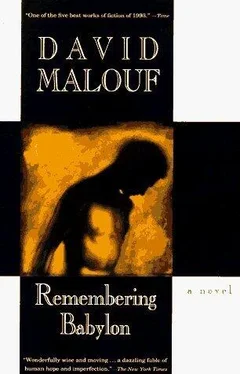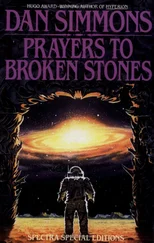They stood side by side and watched her father and Gemmy come up the hill, Gemmy stumbling, her father with one arm round the man, supporting him. Her father raised his head and the look he gave them she would never forget.
He led Gemmy by them and to his sleeping place against the side of the house.
‘Janet come awa’ noo,’ her mother coaxed, touching her lightly, not perhaps for the first time, ‘come ben, come to yur bed.’
When Jock McIvor reached the bottom of the slope, it had been to see no more than the last shadowy retreat of whoever it was. They were gone across the creek. He could hear them crashing through the scrub on the other side. There was no point in following. He had Gemmy to deal with, who was drenched and quaking, and had to be half-carried up the slope.
What he had dreaded most when he had come rushing downhill was that he would have now to come face to face with them; they would stand in the open at last. They had saved themselves, and him too, by making off. Cowards, he thought bitterly. But wasn’t he one too in the relief he felt? He was shaking, but comforted Gemmy as well as he could and for the first time did not draw away when the man clutched and held on.
Looking up about halfway up the slope, he saw his wife. He did not want to face her. She saw it and turned away, and went to where Janet was standing, barefooted at the door.
That was when the real fear, the real anger took him. That in the middle of the night his wife and daughter should be standing out under big clouds at the edge of the dark, hanging together and watching him drag a helpless creature, half out of his wits, back from a moment of senseless bullying, while the men who had done it — neighbours! — were creeping home to crawl in beside their own wives, safe in bed.
He went on past them and dragged Gemmy into the shelter of the lean-to. Laying aside his rifle, he crawled with him into that musty, dark-smelling place, and did a thing he could not for his life have done a week, perhaps even an hour ago: he sat huddled close to him in the dark, and when he shivered, drew him closer, pulled the old moth-eaten blanket round the two of them, and with the man against him, heard his juddering breath, and smelt it, while outside moonlight fell on the cleared space round the hut where his wife and children waited.
Janet lay awake in the dark and it was a long time before her father came in.
She heard him undress and climb into bed, and for a moment they whispered, but she could not make out what they said. In the morning, grim-faced and slow as he always was, her father had nothing to say and she knew that whatever it was that had happened, which she had seen and not seen, she must not ask about.
Once, during the day, her mother came very quietly and kissed her, as if in recognition of something between them that the others were to be kept from, even Lachlan; but she did not know what it was, and when she looked up expectantly, her mother did not enlighten her.
Perhaps the gesture had been meant as a consolation. But for what?
The place where her mother’s dry lips touched her brow glowed, and for a long time afterwards she was aware of it, as if, at that point, a kind of knowledge had been passed to her.
It was the moment she would think of later — more even than the more ordinary and alarming one that came soon after — as the true moment of her growing up.
SMALL FIG OR plum with oval, dark-green leaves, the milky juice of its young shoots being efficacious in healing wounds. The scraped root-bark of another plant (the Ourai or Grevia) is used to make a poultice: large alternate, oval serrated leaf with a small brown berry, generally in pairs, on a small axiliary pendicale .
Barkabah: broad-leafed apple tree with pink and white flowers, the fruit full of seed and tasting a little like dried banana .
Small, creeping leguminous plant that runs in and out of the grass , Kardolo in the native tongue, with a blue flower like that of cultivated tea: three narrow long sharp-pointed leaves upon a common stalk, with a root not unlike carrot .
These entries in Mr Frazer’s field notebook give no indication of the conditions under which they were made. Their clear copperplate, the lines as straight and orderly as a row of cabbages in a Berkshire field, and the details of the drawings that accompany them, do not suggest that what is being recorded belongs still to the untamed wilderness or that the man who is at work on them — a large man in a collarless shirt, the wide-awake hat laid aside for the moment but leaving a red line across his brow under the sweaty scalp — has for the past hour been plunging uphill over rough ground and is now settled on a log in a tropical clearing to set down, in all the excitement of new discovery, what he has just been shown.
To achieve the meticulously detailed drawings and the almost pedantic notes, he has to keep hand and heart steady. It is as if, in disciplining himself to the demands of the work, he has broken through to a cleared place in his own nature where these plants are already installed behind glass.
Gemmy, watching, is solemnly impressed. His tongue, following the movements of Mr Frazer’s hand, works at the corner of his lips as if it too had a part in the business. The drawings for him have a mystical significance. They are proof that Mr Frazer, this odd whitefeller, has grasped, beyond colour or weight or smell, the spirit of what he has been shown. Watching a plant emerge, the swelling bulb or fruit, the perfected leaf, Gemmy is entranced almost to breathlessness, his own spirit suspended as the real, edible object, in its ghostly form, breaks out of itself onto the whiteness of the page.
The accuracy and attention belong to Mr Frazer’s dogged side. Since the day he made his first pot-hook he has known that he is a plodder; that if he is to keep up with the tumbling complexity of things he must pay closer attention than others to every detail. But he adopts quite a different mode when, under the hiss of the evening lamp, he takes out his writing-up book and lets himself loose in the realm of speculation. The lines run crooked then and might come from a different hand, as thought leaps, darts away up sidetracks, doubles back, stops amazed at its own discoveries, dances, kicks its heels up, delightedly tumbles:
We have been wrong to see this continent as hostile and infelicitous, so that only by the fiercest stoicism, a supreme resolution and force of will, and by felling, clearing, sowing with the seeds we have brought with us, and by importing sheep, cattle, rabbits, even the very birds of the air, can it be shaped and made habitable. It is habitable already. I think of our early settlers, starving on these shores in the midst of plenty they did not recognise, in a blessed nature of flesh, fowl, fruit that was all around them and which they could not, with their English eyes, perceive, since the very habit and faculty that makes apprehensible to us what is known and expected dulls our sensitivity to other forms, even the most obvious. We must rub our eyes and look again, clear our minds of what we are looking for to see what is there. Is it not strange, this history of ours, in which explorers, men on the track of the unknown, fall dry-mouthed and exhausted in country where natives, moving just ahead of them, or behind, or a mile to one side, are living, as they have done for centuries, off the land? Is there not a kind of refractory pride in it, an insistence that if the land will not present itself to us in terms that we know, we would rather die than take it as it is? For there is a truth here and it is this: that no continent lies outside God’s bounty and his intention to provide for his children. He is a gardener and everything he makes is a garden. This place too will one day, I believe, yield its fruits to us and to the great banquet at which we are guests, the common feast; as the Americas brought corn and tomatoes and sweet peppers, and rhubarb and the potato, that bitter root of the high Andes that women, over long years, by experiment and crossbreeding, have leached of its poison and made palatable, to be the food of millions. (There is a lily-root here that the women know how to boil and make edible.)
Читать дальше












